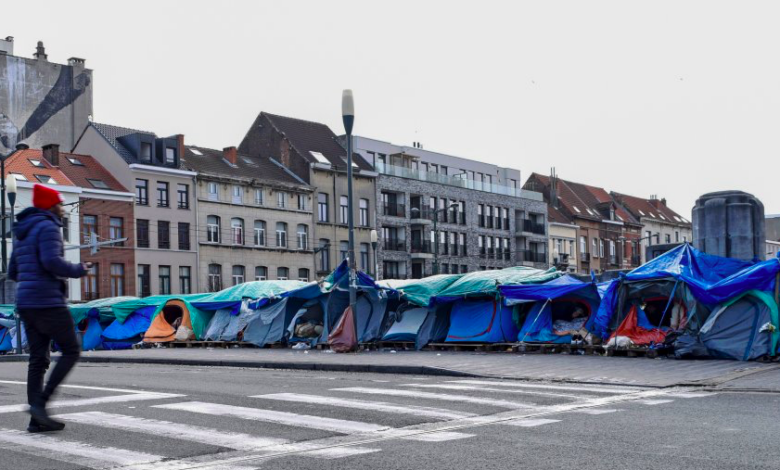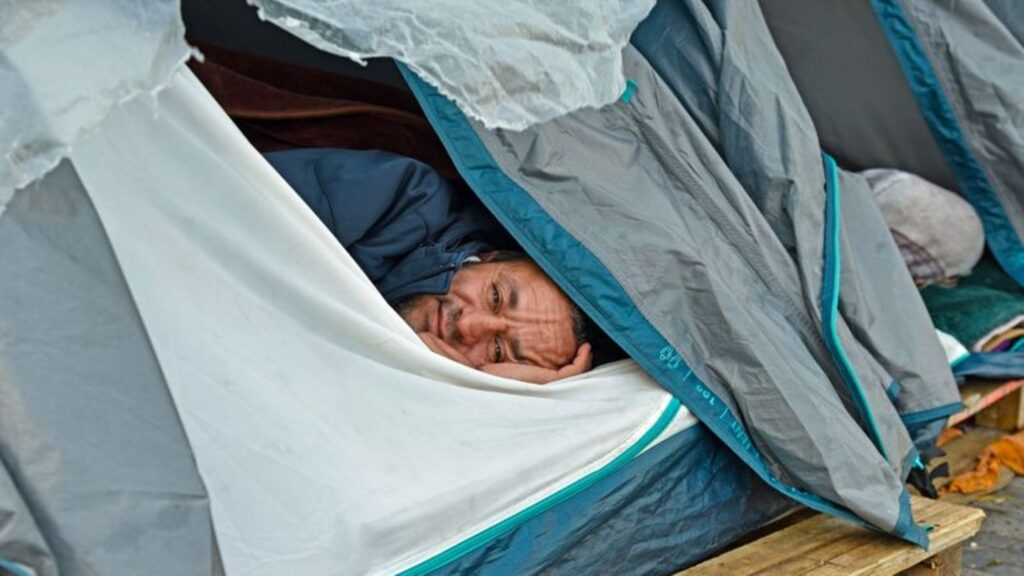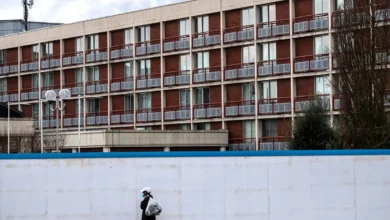In Belgium asylum seekers homeless !

BY|News in Germany
Between thin tent walls, surrounded by dirt, thousands of asylum seekers in Belgium have been living on the streets for months. In the Netherlands, too, many people seeking protection are eagerly awaiting accommodation.
For almost three months, Faraidoon has been sleeping in a small blue tent next to a busy street in central Brussels. A good 20 more tents stand side by side on wooden pallets soaked in rain. Two men often share a meager dwelling. Like 27-year-old Fairadoon, most of them are from Afghanistan. After their arrival in Belgium have applied for international protection. So far, however, they have not received a place in an asylum center to which they are legally entitled.
Asylum accommodation in Belgium and the Netherlands have been hopelessly overloaded for months. According to estimates by the responsible Belgian authority Fedasil, around 3,000 people seeking protection in Belgium were homeless at the beginning of the year. They live in tents like Faraidoon or in an abandoned building in downtown Brussels. “That is unacceptable,” says Fedasil spokesman Benoit Mansy of the German Press Agency. But the capacities were simply not sufficient.
“The situation has fallen below the humanitarian floor”
In the Netherlands, too, many asylum seekers have to live in miserable circumstances. Around 22,000 have been living in emergency shelters for over a year, many of them on camp beds in gymnasiums or large tents for over a year, thin partition walls hardly provide any privacy. “The situation has fallen below the humanitarian lower limit,” said the country’s refugee agency and went to court last summer – with success. The judges ruled that the circumstances did not conform to international norms.
The Dutch asylum crisis is mainly home-made: according to the central authority for the reception of asylum seekers COA, around 47,000 people were here last year asylum searched – not an exceptionally high number. In 2015, around 60,000 were registered. But in order to save money, the government had cut staff and places in reception centers. The waiting time for the processing of asylum applications became longer and longer. In addition, the general misery on the housing market means that there are hardly any free places in the halls of residence. Therefore, many newcomers are housed in makeshift shelters, in gymnasiums or on passenger ships.

Having to sleep on the streets Asylum seekers according to the findings of the German Association of Towns and Municipalities in Germany. Even if the number of people seeking protection in 2022 increased significantly compared to the previous year (by almost 47 percent) – last year around 218,000 people made an initial application for asylum.
What’s wrong?
Why doesn’t Belgium manage to provide better care for asylum seekers? Faraidoon complains that Fedasil keeps telling him week after week that he has to wait for a place to stay. Magali Pratte from the Brussels homeless organization Samussocial accuses politicians of a lack of will. In order to protect people from homelessness, there are also empty buildings in the small kingdom in which those seeking protection could at least temporarily find accommodation. Pratte criticizes, however, that fast, pragmatic solutions are not one of the strengths of the state bodies.
According to the Belgian authority for refugees and stateless persons, almost 37,000 people applied for asylum in Belgium in 2022. Compared to the same period last year, this corresponds to an increase of 42 percent. Most people came from Afghanistan, Syria, Burundi and Palestine. According to the statistics agency Eurostat, around 57,000 Ukrainians sought protection in the country between March and November. However, they do not have to apply for asylum in the EU and have free access to the housing market.
EU countries have been arguing about distribution for years
According to Fedasil, there are a total of 33,500 places in asylum accommodation in the country with 11.6 million inhabitants. 5,000 of them were newly created last year. However, some of the places are occupied for long periods of time because asylum seekers have to wait months for their decision, says spokesman Mansy. The Belgian government demands that asylum seekers should be distributed more evenly across all EU countries. But the EU countries have been arguing bitterly for years about such a distribution.
Recently, even the European Court of Human Rights dealt with the plight of many asylum seekers in Belgium. Almost 150 people seeking protection had sued the Belgian state because, like Faraidoon, they had to sleep on the street – and had no clean toilets and showers available. The court agreed and ordered Belgium to provide housing for the plaintiffs. More than two months have passed since the verdict. When asked by dpa, Fedasil spokesman Benoit Mansy assured that the plaintiffs would be given preferential treatment. However, some of them are still homeless.
They don’t know how long Faraidoon and the other men will have to stay in their tents. According to their own statements, some have been on the streets for five or six months. You don’t see any women in the camp. Like children and families, Mansy says they’re given priority when it comes to housing. According to Pratte, there are cases of scabies, diphtheria and tuberculosis among the homeless. Many have had a difficult life behind them and are traumatized. Life on the streets exacerbates the problems. Despite the adverse circumstances, the men agree: they would rather be on the streets in Belgium than with the Taliban in Afghanistan.




